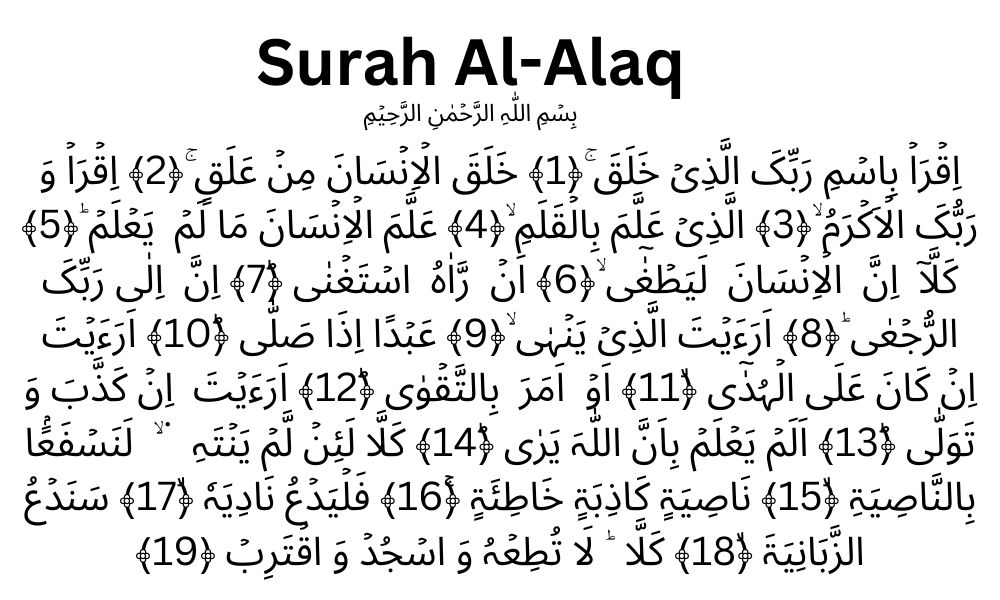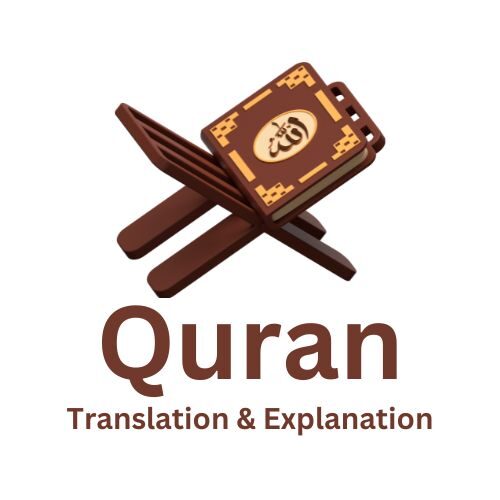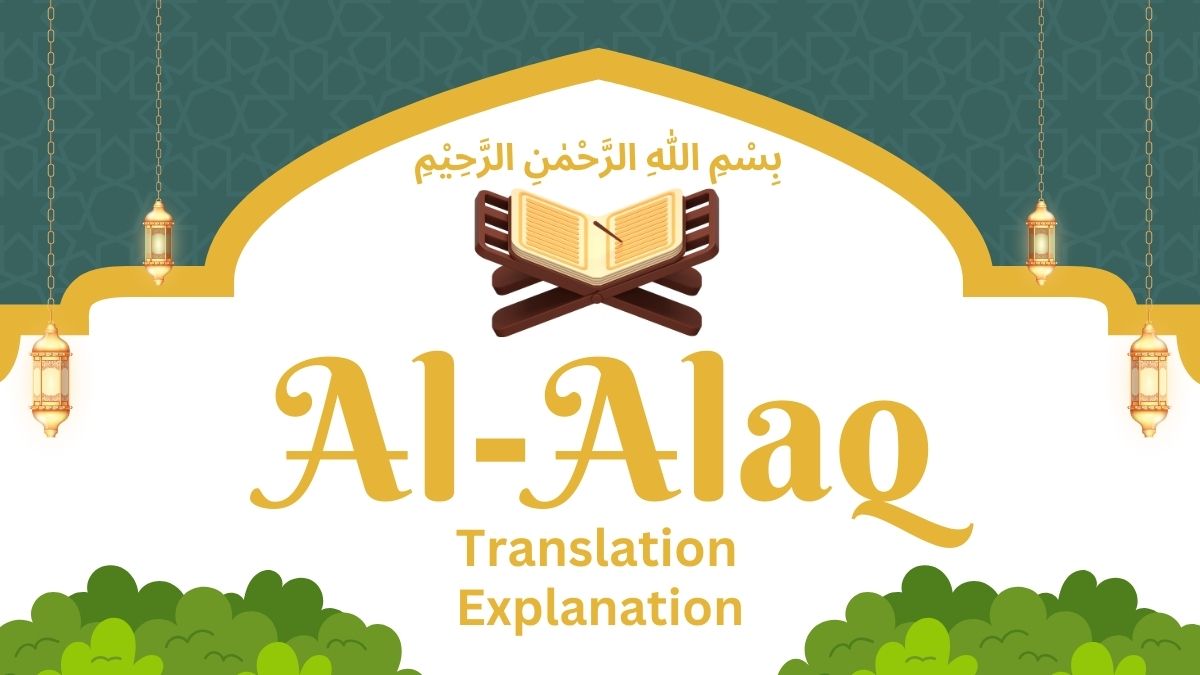Surah Ul-Alaq Chapter:96 Arabic

Table of Contents
Surah Ul-Alaq Chapter:96 Translation
- (O Prophet! ) Read with the help of the name of your nurturing master who created (everything).
- Who created man (like a great thing) from a piece of frozen blood.
- Read that the Lord who nurtures you is the owner of great grace and grace.
- Who taught knowledge through pen.
- And He gave man the knowledge that he did not even know at all.
- Not at all (that is, man should never do this) so that man continues to disobey.
- That too on the basis that he considers himself free from God.
- However, he must turn back to the owner who nurtured him.
- So have you seen the person who stops and forbids.
- To a servant of God when he prays.
- What is your condition that if he (a person praying) is on the straight and right path.
- And he encourages people to fear piety (i.e. ) God and avoid evil.
- What do you think is that he who prevents prayer (Abu Jahl) who denies the truth and turns his face away from it.
- Does he not know that Allah is watching?
- Not at all (i.e. Abu Jahl, who says that when the Messenger of Allah (PBUH) prays, I will press his neck with my feet, he will never be able to do so) If he does not stop (from his wickedness), then We will grab his forehead hair and drag him.
- The forehead that is both a liar and a sinner.
- He should play the gathering of his colleagues and supporters.
- We call severely punishing angels and pushing watchmen.
- Not at all (i.e. we will never leave him) You will never listen to him (in the presence of your Lord) prostrate and get his closeness.
Surah Ul-Alaq Explanation
Surah Ul-Alaq Chapter:96 Verse 1 Explanation
As we mentioned in the Introduction, when the Angel teached the Prophet (peace be upon him) to read, he answered, “I can’t read!” This suggests that the Angel had presented the words of revelation to him in written form and asked him to read them. If the Angel had intended for him to simply repeat what was recited, the Prophet would not have replied with, “I cannot read!”
2. “Read in the name of your Lord”: This means to say Bismillah and then read. It indicates that even before this revelation was revealed, the Prophet (peace be upon him) recognized Allah as his sole Lord. 3. The term khalaqa (created) is used in an absolute sense, without specifying what was created. This implies: Read in the name of the Lord, Who is the Creator, the One who created the entire universe and everything within it.
Surah Ul-Alaq Chapter:96 Verse 2 Explanation
The text begins by discussing the creation of the universe and then focuses specifically on humanity, highlighting how Allah created man in a perfect form, starting from a humble and insignificant beginning. The term “Alaq” is the plural of “alaqah,” which refers to congealed blood, representing the initial state of the embryo that appears a few days post-conception. Following this stage, the embryo develops into a lump of flesh and gradually takes on a human shape. (For further details, refer to Surah Al-Hajj, Ayat 5 and the corresponding explanatory notes 5 to 7.)
Surah Ul-Alaq Chapter:96 Verse 4 Explanation
It is indeed a great blessing from Allah that He began the creation of man from a humble origin and endowed him with knowledge, the highest attribute of creation. Not only did He grant man this knowledge, but He also taught him the skill of writing with a pen, which became essential for the spread, advancement, sharing, and preservation of knowledge on a grand scale. Without the divine gift of writing and the art of the pen, human intellect would have remained stagnant, lacking the opportunity to grow, evolve, and serve as a means to pass knowledge from one generation to the next, paving the way for future advancements.
Surah Ul-Alaq Chapter:96 Verse 5 Explanation
Initially, humans were completely illiterate. Any knowledge they acquired was a gift from Allah. Whenever Allah chose to open doors of knowledge for humanity, they would unfold before them. This concept is reflected in the verse of the Throne (Ayat-ul-Kursi), which states: And the people cannot comprehend anything of His knowledge except what He Himself may choose to reveal.
(Surah Al-Baqarah, Ayat 255). What people consider their own scientific discoveries were, in reality, unknown to them until Allah granted them that knowledge at His discretion, often without their awareness of His grace. These verses were among the first revealed to the Prophet (peace be upon him), as mentioned in a Hadith narrated by Aishah.
The intensity of this initial experience was overwhelming for the Prophet (peace be upon him), leading him to realize that the Being he recognized as his Lord and Sustainer was directly communicating with him, beginning to send down revelations and appointing him as His Prophet (peace be upon him). After a period of pause, the opening verses of Surah al-Muddathir were revealed, outlining the mission he was to undertake following his appointment to Prophethood. (For further details, see the Introduction to Al-Muddathir).
Surah Ul-Alaq Chapter:96 Verse 6 Explanation
A person should never take on an attitude of ignorance and defiance towards the Generous God who has been so kind to him.
Surah Ul-Alaq Chapter:96 Verse 7 Explanation
When a man achieves wealth, honor, and status, along with everything else he sought in life, he often becomes defiant rather than thankful, crossing the limits of his servitude to Allah.
Surah Ul-Alaq Chapter:96 Verse 8 Explanation
No matter what he may have achieved in life that leads him to act with arrogance and defiance, ultimately he must return to his Lord. It is then that he will understand the consequences of his attitude and actions.
Surah Ul-Alaq Chapter:96 Verse 10 Explanation
The Prophet (peace be upon him) is referred to by this title in several places throughout the Quran. For instance, Glory be to Him Who transported His servant one night from the Masjid al-Haram to the distant Temple. (Surah Al-Kahf, Ayat 1); And that when the servant of Allah stood up to pray, the people prepared to attack him. (Surah Al-Jinn, Ayat 19). This illustrates a unique expression of love through which Allah refers to His Messenger Muhammad (peace be upon him) in His Book.
Additionally, it indicates that after appointing His Messenger to Prophethood, Allah taught him how to perform the Prayer. The Quran does not specify: O Prophet, perform the Prayer in this manner. Thus, this serves as further evidence that the Revelation given to the Prophet (peace be upon him) included more than what is recorded in the Quran.
Surah Ul-Alaq Chapter:96 Verse 14 Explanation
The audience here seems to be every ordinary person, who is being asked: Have you seen the actions of someone who stops a servant from worshiping God? What do you think: if the servant is truly guided, or if he is warning people to fear God and avoid evil, and this prohibition is denying the truth and turning away from it, what would his actions be like?
Could this person maintain such an attitude if he understood that Allah is observing both the one who encourages others to be pious and the one who denies the truth and turns away from it? Allah sees the oppressor and his wrongdoings, as well as the oppressed and their suffering, which suggests that He will punish the oppressor and address the grievances of those who have been wronged.
Surah Ul-Alaq Chapter:96 Verse 15 Explanation
The individual who claims he would trample Muhammad’s (peace be upon him) neck while he was praying would never actually be able to do so.
Surah Ul-Alaq Chapter:96 Verse 17 Explanation
As mentioned in the Introduction, when the Prophet (peace be upon him) confronted Abu Jahl about his foolish actions, Abu Jahl responded: O Muhammad, what power do you think you have to threaten me? I swear, my followers in this valley outnumber yours significantly. In response, it was suggested: Let him summon his group of supporters.
Surah Ul-Alaq Chapter:96 Verse 18 Explanation
According to Qatadah’s explanation, the term zabaniyah in the original text refers to the police in Arabic. Similarly, kings had armed attendants who would remove anyone the king was displeased with. Thus, what Allah is conveying is: Let him call upon his supporters; we will also summon Our Police, meaning the angels of torment, to confront him and his followers.
Surah Ul-Alaq Chapter:96 Verse 19 Explanation
Sajdah (prostration) here refers to the Prayer, suggesting: O Prophet, continue to perform your Prayer with confidence as you have done before, and seek your Lord’s presence through it. In the Sahih of Muslim and other Hadith collections, there is a narration from Abu Huraira stating that the servant is closest to his Lord when in prostration. Additionally, in Muslim, there is another narration from Abu Huraira indicating that when the Prophet (peace be upon him) recited this verse, he performed a sajdah of recital.
Read Surah Ut-Teen Click Here.


1 thought on “Surah Ul-Alaq Chapter:96”